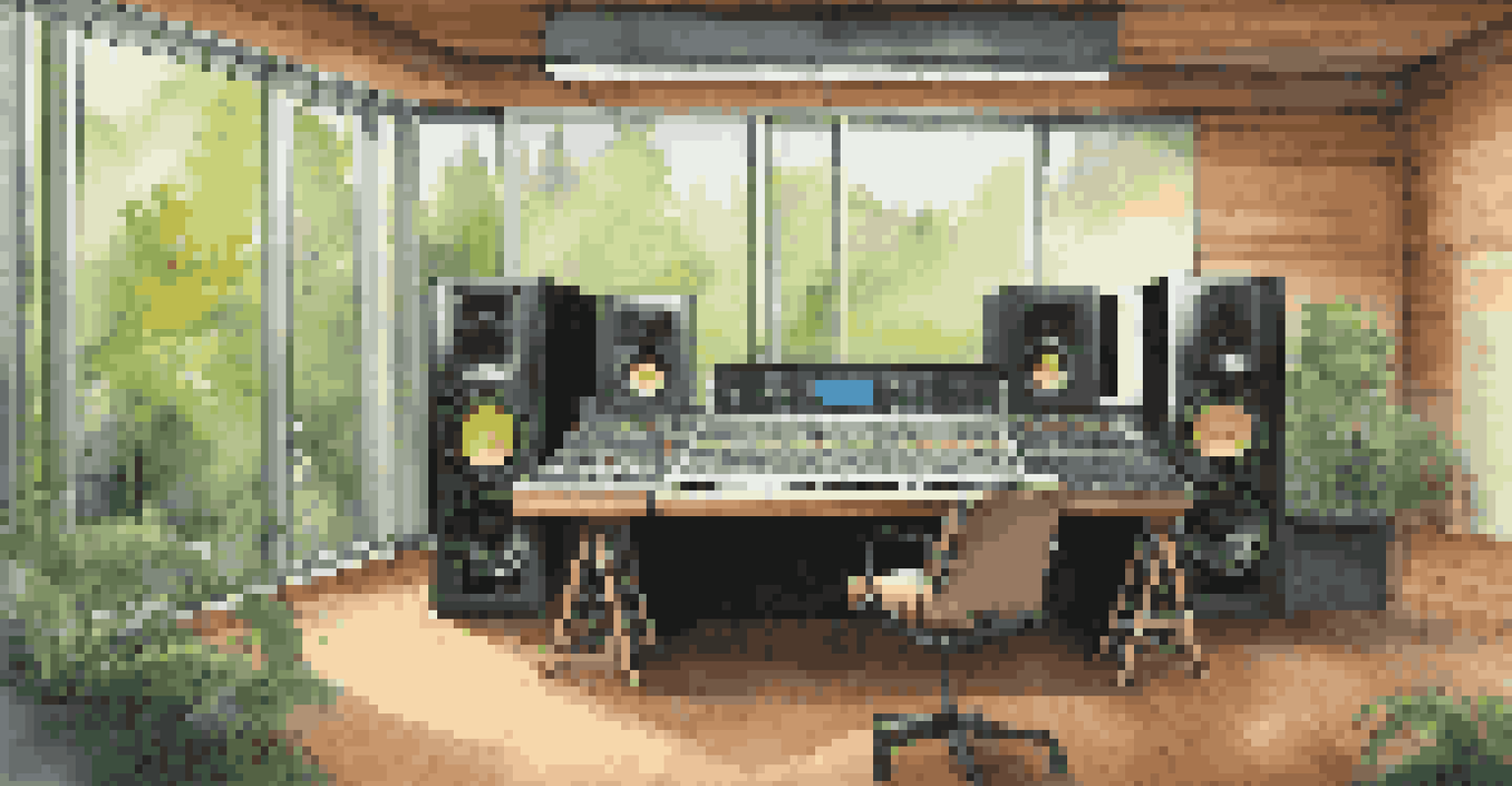Sustainable Innovations in Music Technology and Equipment

The Rise of Eco-Friendly Instruments in Music
As musicians become more aware of their environmental impact, eco-friendly instruments are emerging as a popular choice. These instruments, made from sustainable materials, not only reduce waste but also often deliver unique sounds that stand out in the music world. For example, some guitar manufacturers are utilizing reclaimed wood, giving new life to materials that might otherwise be discarded.
The greatest threat to our planet is the belief that someone else will save it.
Additionally, brands are exploring alternatives to traditional materials, like bamboo and recycled plastics, which can lessen the carbon footprint of instrument production. This shift not only appeals to eco-conscious musicians but also helps to promote a broader cultural change within the industry. As artists advocate for sustainability, their choices influence fans and aspiring musicians alike.
Ultimately, the rise of eco-friendly instruments reflects a growing commitment to sustainability in music. It's about creating beautiful sounds while respecting the planet, and this harmony between artistry and environmental consciousness is paving the way for a more sustainable future in the industry.
Sustainable Amplifiers and Sound Equipment Innovations
In the realm of sound equipment, sustainability is also making waves, particularly with amplifiers and speakers. Companies are now creating energy-efficient models that consume less power without sacrificing sound quality. For instance, some brands have developed amplifiers that use Class D technology, which provides high output while being more energy-efficient than traditional models.

Moreover, manufacturers are increasingly focused on using recyclable materials in their products. This means that when an amplifier reaches the end of its life, its components can be repurposed, reducing landfill waste. This practice not only helps the environment but also encourages consumers to think about the lifecycle of their gear.
Eco-Friendly Instruments Are Rising
Musicians are increasingly choosing eco-friendly instruments made from sustainable materials, which not only reduce waste but also produce unique sounds.
These innovations in sound equipment are not just beneficial for the planet; they also resonate well with consumers who are keen on supporting brands that prioritize sustainability. As musicians become more aware of their choices, the demand for eco-friendly sound solutions is likely to increase, pushing the industry towards greener practices.
The Role of Digital Music Platforms in Sustainability
Digital music platforms have revolutionized how we consume music, and they are also stepping up to address sustainability. By minimizing physical production, these platforms reduce waste associated with CDs and vinyl records. Instead of relying on tangible products, streaming services allow users to access a vast library of music without the environmental costs of manufacturing.
Sustainability is no longer about doing less harm. It’s about doing more good.
Additionally, many platforms are investing in renewable energy sources to power their servers, significantly lowering their carbon footprints. For example, major streaming services have committed to achieving carbon neutrality by using wind and solar energy. This not only helps the environment but also sets a standard for other tech companies to follow.
The shift towards digital has created a space where sustainability and accessibility go hand in hand. As more artists embrace online distribution, the music industry can continue to thrive while promoting eco-friendly practices, ensuring that music remains an integral part of our lives without harming the planet.
Innovations in Music Production and Recording
The music production process is also evolving with sustainable innovations, particularly in recording studios. Many studios are now adopting green building practices, utilizing energy-efficient lighting, and using sustainable materials in their designs. This not only reduces their environmental impact but also creates a healthier workspace for artists and engineers.
Moreover, advancements in software and technology are enabling producers to create music without the need for extensive physical equipment, further minimizing waste. For instance, virtual instruments and plugins allow for limitless creativity without contributing to material consumption. This shift is reshaping how music is produced and making it more accessible for independent artists.
Sustainable Sound Equipment Innovations
The sound equipment industry is embracing sustainability by developing energy-efficient amplifiers and using recyclable materials, appealing to eco-conscious consumers.
Ultimately, sustainable innovations in music production are about harmonizing creativity with environmental responsibility. By rethinking traditional practices, the industry has the potential to reduce its carbon footprint while still delivering high-quality music that resonates with audiences around the world.
The Importance of Sustainable Packaging in Music Products
As the music industry continues to shift towards sustainability, packaging is an area that has seen significant innovation. Artists and labels are increasingly opting for environmentally friendly packaging materials for their physical products, such as biodegradable or recycled materials. This not only reduces waste but also sends a strong message to fans about the importance of sustainability.
For example, vinyl records are being produced with eco-conscious packaging that minimizes plastic use and embraces sustainable inks. This not only enhances the aesthetic appeal of the product but also aligns with the values of environmentally aware consumers. It’s a win-win situation that combines artistry with responsibility.
By prioritizing sustainable packaging, the music industry can influence consumer behavior and encourage fans to make eco-friendly choices. As artists lead the charge in adopting these practices, it helps foster a culture of sustainability that extends beyond music to other aspects of daily life.
Collaborations Between Artists and Sustainable Brands
Collaboration between artists and sustainable brands is becoming increasingly common, creating a powerful synergy that promotes eco-friendly practices. Musicians are partnering with companies that share their commitment to sustainability, producing limited-edition products that highlight both their artistry and environmental responsibility. This not only raises awareness but also creates unique items that fans are eager to support.
For instance, some artists have collaborated with eco-conscious clothing brands to create merchandise made from organic materials. These partnerships not only provide fans with stylish options but also encourage them to consider the environmental impact of their purchases. It’s a creative way to blend music and sustainability while strengthening an artist's brand.
Digital Platforms Promote Sustainability
Digital music platforms are minimizing waste through streaming services and investing in renewable energy, showcasing a commitment to environmental responsibility.
These collaborations showcase the potential for art and commerce to align with a common goal: protecting our planet. As more artists embrace this approach, they inspire their audiences to make conscious choices, fostering a more sustainable music culture.
The Future of Sustainability in Music Technology
Looking ahead, the future of sustainability in music technology appears promising, with innovations continuing to emerge. Companies are investing in research and development to create even more efficient and environmentally friendly products. From sustainable materials to advanced software solutions, the possibilities are endless as the industry adapts to the growing demand for eco-conscious choices.
Furthermore, as awareness around climate change and environmental issues increases, the music community is poised to become a leader in sustainability efforts. Artists, producers, and fans alike are becoming more vocal about their commitment to the planet, creating a culture that values sustainability as a core principle. This collective mindset can drive significant changes within the industry.

Ultimately, the future of music technology is about finding a balance between creativity and sustainability. As innovations continue to unfold, the music industry has the unique opportunity to lead by example, inspiring other sectors to embrace environmentally responsible practices and make a positive impact on the world.